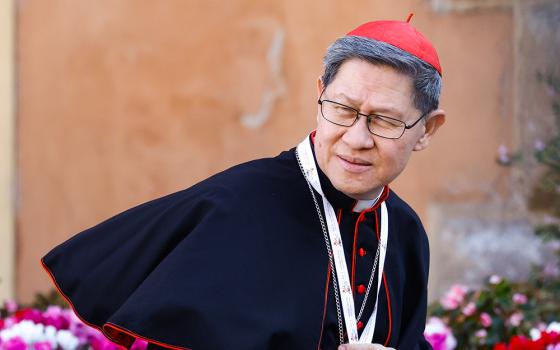
LOUISVILLE, KY. -- More than 3,100 Catholic pastoral musicians from around the United States, Canada and Mexico gathered at the Kentucky International Convention Center in downtown Louisville to prepare for the implementation of the new English translation of the Roman Missal.
Parishes around the United States will begin using the new text -- and some new music with it -- for the celebration of Mass Nov. 27, the first Sunday in Advent.
“Whether we will sing new words to old tunes or new words to new tunes, the upcoming changes will affect all of us,” Dominican Fr. Paul Colloton told the crowd during the opening of the National Pastoral Musicians Convention July 18. Colloton is the organization’s director of continuing education.
Then he called on the crowd -- or as it seemed at times, the 3,000-voice choir -- to sing with him the line, “Sing to the Lord a new song,” the theme of this year’s convention.
Colloton acknowledged that the new missal translation will bring changes in the Mass but said it also offers Catholics an opportunity to find a “deeper relationship with Jesus Christ” so that “we can sing to the Lord with new words,” and he directed the crowd to sing the latter in unison.
The crowd did nearly as much singing as listening during the opening program.
Keynote speaker Msgr. Ray East wove music intermittently into his speech.
He opened the address with a passionate delivery of “Give Me Jesus,” an African-American spiritual, thrilling the crowd with his velvety baritone. Spontaneously throughout his address, he drew the crowd into song, too.
Singing the Magnificat at one point, East told the crowd, “That ‘yes’ Mary said changed the history of the world.
“I also believe that your ‘yes’ to everything that [is changing in the liturgy] will change our worship for the better,” he said.
East, pastor of St. Teresa of Avila in Washington, noted that some people came to the convention “with anger” and some came “sad.” A variety of emotions have animated responses to the new Roman Missal, he said.
“All of us came here with questions, panicking about the advent of Advent,” he said, as the crowd murmured with comments. “But I hope that somebody came here to Louisville with an open mind ... with an open heart to listen, to learn, to study. And I hope somebody came to ‘sing to the Lord a new song.’ ”
Pastoral musicians, who will find themselves teaching congregations about the new text as they introduce new music, will play a key catechetical role in the changes, he noted.
“We have a new role, and we have to be converted in our hearts to expand this role,” the monsignor told them.
Camilla Gehring, who traveled to the convention from her parish in Columbus, Ind., said she and her fellow choir members at St. Bartholomew Church hope the convention helps to prepare them for this new role.
“The new liturgy is a big draw for a lot of people,” she said. The convention “gives us a chance to be exposed to the new arrangements ahead of time.”
During the convention, attendees have had the opportunity to listen to and purchase music for new Mass settings written for the new translation.
While the convention focused on the new missal, it also drew liturgists looking for professional development, camaraderie and a little inspiration for their ministry.
A group from Louisville’s Church of the Epiphany said they came for the fellowship and the opportunity to meet the big names in Catholic pastoral music.
“It’s like a shot in the arm, being in the presence of other musicians,” said Cindy Simpson, a cantor at Epiphany. “It’s just so exciting.”
Faith Murphy, the parish’s choir director, said she attended the convention to develop her skills as a director.
Among the thousands at the convention center were about 400 volunteers, primarily Catholics from Louisville archdiocese parishes, who kept the convention running behind the scenes.
Organizers said this year’s convention is the largest in its history. That’s in part because of the upcoming changes in the liturgy, said Judy Bullock, director of the Louisville archdiocesan Office of Worship and the chair of the convention.





